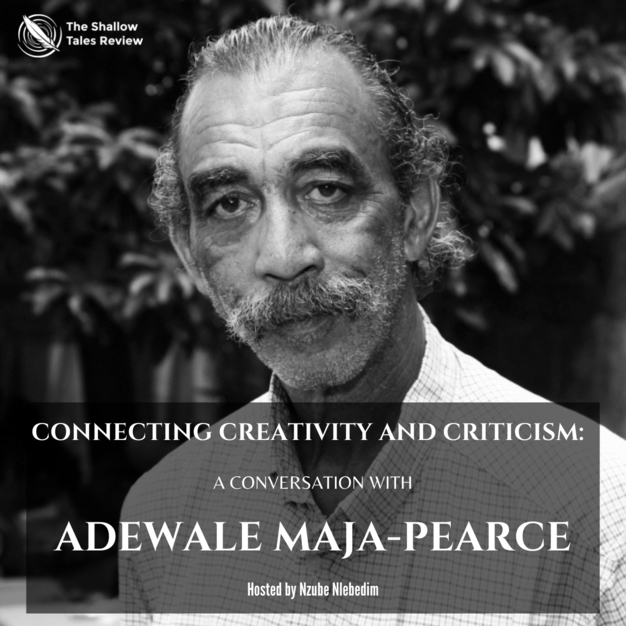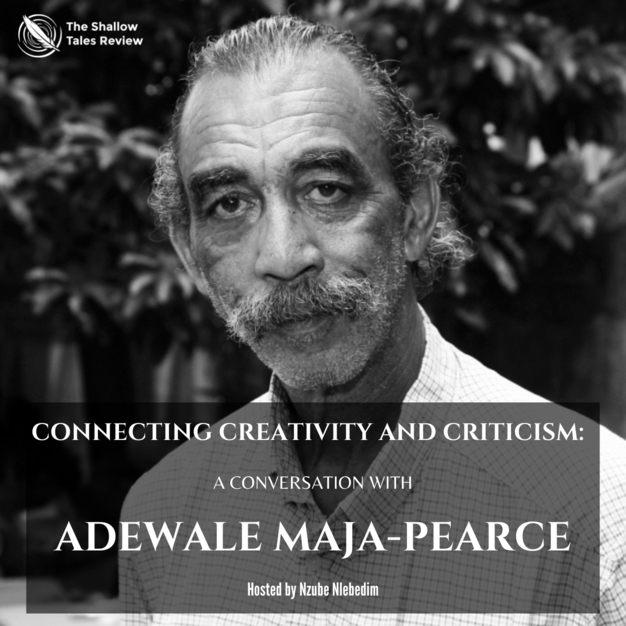
Adewale Maja-Pearce was born in London, England in 1953 and grew up in Lagos, Nigeria, where he currently lives. He has a BA in History from the University College of Wales, Swansea, and an MA from the School of Oriental and African Studies, University of London.
He is the author of a number of books, including Loyalties and Other Stories, In My Father’s Country: A Nigerian Journey, How many miles to Babylon?, Who’s Afraid of Wole Soyinka: Essays on Censorship, A Mask Dancing: Nigerian Novelists of the Eighties, Remembering Ken Saro-Wiwa and Other Essays, A Peculiar Tragedy: JP Clark-Bekederemo and the Beginning of Modern Nigerian Literature in English, and The House My Father Built. He edited Christopher Okigbo: Collected Poems, The Heinemann Book of African Poetry in English, Wole Soyinka: An Appraisal, The New Gong Book of New Nigerian Short Stories, and Dream Chasers: New Nigerian Short Stories.
He was formerly editor of the Heinemann African Writers Series (1986-1994), and Africa editor of Index on Censorship (1986-1997), the London-based magazine of free of expression.
He has contributed essays and reviews to a number of publications, including Granta, Times Literary Supplement, Prospect, The Guardian (London), The New York Times, Virginia Quarterly Review, and London Review of Books.
He currently runs YEMAJA, an editorial services agency, and is a partner in The New Gong (www.thenewgong.com), an independent publishing company.
He is married to Juliet Ezenwa, the artist.
I bought and read your memoir, The House My Father Built, in 2019, five years after it was published in 2014. It details the struggles you, newly-come into an inheritance from your father, face in compelling your tenants to move out. What inspired you to write that work?
I had writing it in mind from the very beginning of my contest with the tenants because it seemed to me then – and I was proved right – that it would afford me a way of writing about Nigeria from a fresh angle.

There I was, going between courts, police stations and lawyers’ offices. The story was ready-made, just waiting to be written. Indeed, Nigeria is magical-realist enough as it is without having to make anything up, which is why I wonder about this obsession with the novel.
Some writers say that memoirs and autobiographies tend to meld the already blurred lines between fiction and nonfiction, truth and untruth. Would you say The House My Father Built was completely nonfiction? Were there fictional bits in it?
There were no fictional bits. Everything happened as I wrote it. Indeed, I had to downplay some of the more outrageous antics of the characters, particularly the now late Prince, who started off as a God-send while I was battling the recalcitrant tenants before turning into a nuisance himself, and at one point hiring assassins, which landed him in Ikoyi prison.
You wrote the 1998 and 1999 annual reports on human rights violations in Nigeria? What was the experience like doing that?
They were writing assignments which paid, and so I was happy to do them. I also enjoy research – I read history at university – and was pleased for the opportunity to record what life was like under the military. I agree with the sentiments of the late Chief Obafemi Awolowo that the worst civilian government is better than any military government, although we might be in danger of forgetting that under the current dispensation, but that’s another story.
You emerge as one of the strongest, most vocal critical voices from the second generation of Nigerian writers. What is your opinion on the trans-generational transfer and influences from the first to this present generation of Nigerian writers?
I don’t think it is possible for me to say, for the simple reason that I am too close to it; only time will give us that perspective, and by then, we won’t be around.
How was growing up for you, straddling between two strong cultures and nationalities, Nigerian and British?
Nigeria was still a colony for the first seven years of my life, and everything around me was British, including the schools I went to, where our teachers and most of the pupils were British. At the same time, my father never admitted me into his culture. Yoruba was never spoken in the house, and the first time I ate Nigerian food was in boarding school from when I was 11. In short, we lived in a British enclave, only visiting Abeokuta for a few hours once a year where my brothers and I endured oily buns, warm Coke and children coming to gawp at these oyibo children with their oyibo mother. In short, I was a thoroughgoing Englishman with little connection to my other strong ‘culture’, which, paradoxically, is why I find myself back here. Discovering Nigeria is what fires my imagination and is at the bottom of all my work. I can’t get enough of this country; England I know in my bones. I also love the Nigerian weather!
You have a long-standing and impressive history with the London Review of Books. You have an upcoming project slated for 2022. What would you like to share about this new work?
Actually, the proposed book, Legacies, is a collection of essays – my second after Remembering Ken Saro-Wiwa – most of which first appeared in the LRB. Otherwise, I am proposing to undertake a 3-month journey around West Africa which will hopefully result in a book.
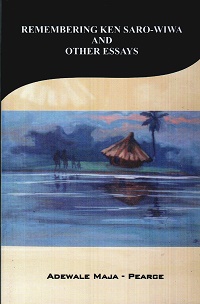
Your confrontation with Nobel Laureate, Professor Wole Soyinka following your review of his You Must Set Forth at Dawn happened over fourteen years ago. Has your relationship with Mr. Soyinka grown any cordial ever since the 2007 publication of the review by the London Review of Books?
Not at all; if anything, it has grown worse.
Have there been any regrets on your part over what happened?
None. He wrote a book, I reviewed it. In my opinion, his subsequent utterances and actions have been petty, spiteful and self-dramatising.
Can you say that your Yoruba heritage has had any major influence on your artistry?
Hardly.
You write both creative literature as well as literary and social commentaries. In My Father’s Country: A Nigerian Journey (1987), A Mask Dancing (1992), Remembering Ken Saro-Wiwa and other essays (2005), A Peculiar Tragedy (2010), Who’s Afraid of Wole Soyinka? (1991), and Loyalties (1986), are only few of your many book titles. What would you describe as your strongest suit? Creative or critical literature?
I think of myself fundamentally as an essayist, I hop in a line from William Hazlitt through George Orwell to James Baldwin (with Francis Bacon lurking around somewhere).

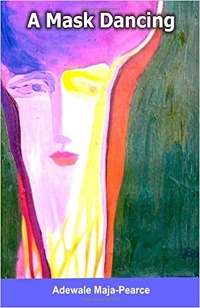
The essay can take the form of travel (In My Father’s Country) or memoir (The House…) but basically ‘creative nonfiction’, as the terminology would have it.

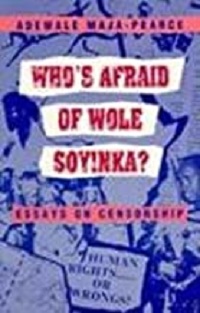
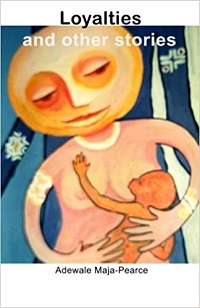
What is your take on the role of literary criticism vis-à-vis the production of creative literature?
I think we could do with far less of critical literature. But I have no strong feelings about this comparison.
Nigerian and African literature is progressing at lightning speed today. What is your opinion on the current ideological — even narratological and thematic — shift in 21st century Nigerian and African literature?
I don’t really follow it closely enough to make a judgment.
What new writers today impress you the most?
Again, as above.
What writers have inspired your work over the decades?
I would say particular books, poems, essays and short stories. I dislike the modern veneration of the writer qua writer as distinct from their work. The first book that opened me up to the magic of language was The Lion, the Witch and the Wardrobe by CS Lewis, which I read when I was seven. Six decades later, I still remember where I was sitting in my bedroom overlooking the lagoon at the bottom of the garden and not wanting it to finish.
In recent times, I have noticed there is a dearth and gradual extinction of literary commentators good enough to throw hard, effective punches in the creative industry. What is your take on this seeming scarcity?
I suppose they would have to come out of the universities, on the one hand, and the media, on the other. Now if there’s anything happening on our campuses, in any department, I would very much like to hear about it. As for our media houses, a few individuals are trying but without much encouragement.
Is there a thematic or ideological gap in creative literature today which you would rather see bridged?
More – much more – writing in Igbo and Yoruba instead of hankering after a foreign audience in far away capital cities where your editor would be hard-pressed to locate Nigeria on the map, much less know what akara — sorry, bean cake — is. And there is such a thing as translation.
At what point did you know writing was the path to tread?
As I have indicated above, I think I unknowingly started on the path when I was seven, but the turning-point came in my final year at university. I just couldn’t imagine being a history professor, and then, one weekend, I read Dostoevsky’s Crime and Punishment and Faulkner’s Light in August back-to-back, and that was it. Ironically, I won a scholarship to do a Master’s in Canada and proceeded to read Henry Miller, notably Tropic of Cancer and just couldn’t take it anymore. I jacked in the degree, bought an electric typewriter (no laptops in those days) and wrote a novel in six months flat, thereby teaching myself to type.
In retrospect, what advice would you have given your younger, unpublished self?
Go for it, but then I have been enormously lucky. The point is not to be afraid of pursuing your dreams. They are all we really have; they are who we are. Life is pointless otherwise.

